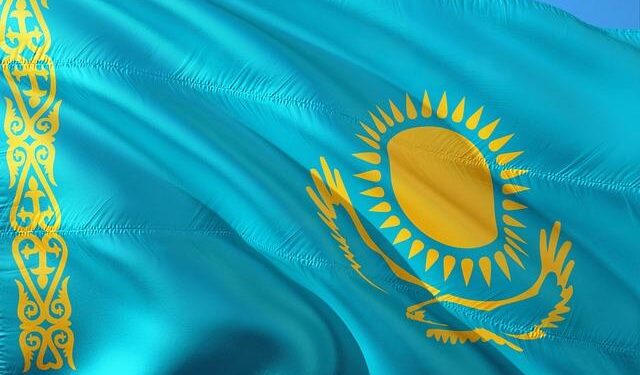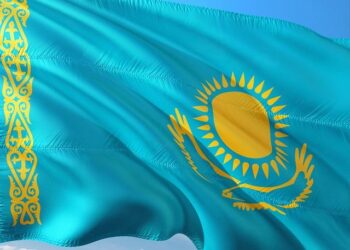In the wake of transformative political upheaval, Kazakhstan finds itself at a crossroads as President Kassym-Jomart Tokayev embarks on a bold initiative to redefine the nation‚Äôs identity and governance model under the banner of “New Kazakhstan.” Following the tumultuous events of early 2022, which sparked widespread protests and a subsequent clampdown on dissent, Tokayev’s management has sought to distance itself from the legacy of his predecessor, Nursultan Nazarbayev. However, as the government implements a series of reforms aimed at fostering political pluralism and economic diversification, questions arise about the sincerity and efficacy of this rebranding effort. Is “New Kazakhstan” truly a departure from the old guard, or merely a fa√ßade designed to consolidate power while appeasing a restless population? in this article, we delve into the complexities of Tokayev‚Äôs ambitious agenda, exploring the challenges and contradictions inherent in his vision for a reformed Kazakhstan.
Understanding Tokayevs Vision for a New Kazakhstan
President Kassym-Jomart tokayev’s vision for a new Kazakhstan focuses on significant reforms aimed at shaking off the remnants of the previous regime while maintaining stability in a nation characterized by its unique blend of history and modern aspirations. Under his leadership, key priorities include enhancing governance, fostering economic diversification, and promoting social equity. Central to his strategy is the concept of ‘listening to the people,’ which reflects a break from established norms of top-down governance. This approach is expected to pave the way for increased public participation in political processes, leading to what Tokayev describes as a ‚Äúnew political culture.‚Äù These reforms encompass a range of initiatives, such as the establishment of a new electoral framework and the bolstering of civil society organizations.
Moreover, Tokayev is committed to addressing systemic corruption in government and public institutions, viewing it as a major impediment to Kazakhstan’s progress. His administration seeks to implement transparency measures that promote accountability among public officials and facilitate a more open government. For Tokayev, this reform agenda also entails a strong emphasis on sustainable development, which he claims is essential for creating a prosperous future.To visualize some of these initiatives, consider the following table detailing key aspects of the reform agenda:
| Focus Area | Initiatives |
|---|---|
| Governance | Electoral reforms, enhanced public engagement mechanisms |
| Transparency | Anti-corruption measures, open government initiatives |
| Economic Diversification | Investment in technology, promotion of small to medium enterprises |
| Social Equity | Programs targeting education and healthcare accessibility |
evaluating the Impact of Political Reforms on Governance
The political landscape of Kazakhstan has been undergoing a change under President Tokayev, who seeks to redefine governance through a series of reforms. These changes aim to enhance political participation, bolster transparency, and strengthen the rule of law. However, the effectiveness of these reforms largely depends on their implementation. Political analysts suggest that while there are positive intentions behind Tokayev’s initiatives, the entrenched interests of the old guard may undermine genuine progress.
Key areas of focus in evaluating the reforms include:
- Decentralization of Power: Moving authority closer to local governments to empower citizens and reduce bureaucratic inefficiencies.
- Judicial Independence: Ensuring that courts operate free from political pressures is crucial for public trust in the legal system.
- Freedom of Expression: Allowing media and civil society to operate without censorship can contribute to a more informed and engaged populace.
Additionally, many experts are monitoring the potential risks involved, such as the possibility of reform fatigue among citizens, who may become disillusioned if visible changes are not reflected in their daily lives. hence, Tokayev’s administration will need to demonstrate that these reforms lead to tangible improvements in governance and quality of life for all citizens.
| Reform Area | Current Status | Potential Challenges |
|---|---|---|
| Decentralization | In progress | Resistance from local elites |
| Judicial Independence | Limited | Influence from political figures |
| Media Freedom | Moderate betterment | Censorship and self-censorship |

the Role of Youth Engagement in Shaping Future Policies
In an era where the voices of the younger generation are becoming increasingly influential, the significance of their engagement in policymaking cannot be overstated. Young people bring fresh perspectives, innovative ideas, and a willingness to challenge the status quo, making their involvement crucial for any nation looking to evolve. By actively participating in political discourse, youth can advocate for issues such as climate change, education reform, and social justice, all of which are vital for a more equitable future. Their unique insights can lead to more representative and adaptable policies that resonate with the aspirations of a rapidly changing society.
The integration of youth engagement into policy formation not only enriches the decision-making process but also fosters a sense of ownership among young citizens. When thay see their contributions valued, it increases political awareness and encourages civic participation. Various initiatives have demonstrated this potential,including:
- Youth Parliaments: Platforms where young individuals can debate and propose legislation.
- Advisory Councils: Involving youth in governmental advisory roles to ensure their perspectives are considered.
- social Media Campaigns: Utilizing digital platforms to mobilize young advocates and raise awareness on key issues.
To effectively harness the energy of the youth demographic, it’s essential for policymakers to create inclusive environments where young voices can thrive. Employing clear channels of communication, providing resources for youth-led initiatives, and fostering partnerships with educational institutions can considerably enhance their involvement. The table below illustrates some key initiatives and their impacts on youth engagement in policy:
| Initiative | Impact |
|---|---|
| Youth Action Programs | Empowers young people through skill development and leadership training. |
| online Forums | Encourages dialogue between youth and policymakers on pressing issues. |
| Community Projects | Promotes local engagement and grassroots activism among youth. |

Economic Diversification Strategies for Sustainable Growth
As Kazakhstan moves towards achieving a balanced economic landscape, fostering resilience through diversification remains crucial. The government under Tokayev is exploring several initiatives aimed at reducing dependency on any single sector, particularly oil and gas. Key areas of focus include:
- Agriculture and Food Security: enhancing agricultural productivity through technology and sustainable practices.
- Renewable Energy: Investing in solar, wind, and hydroelectric power to transition away from fossil fuels.
- Tourism Development: Promoting Kazakhstan’s rich cultural heritage and natural beauty to attract global visitors.
- Technology and Innovation: Encouraging startups and fostering a digital economy through improved infrastructure and support.
To synergize these efforts, the government is putting in place structures aimed at fostering collaboration between public and private sectors. A notable strategy involves the establishment of special economic zones (SEZs) dedicated to innovation, which will reduce barriers for new enterprises. An illustrative overview of these SEZs is outlined in the table below:
| Name of SEZ | Focus Area | Expected Outcome |
|---|---|---|
| Astana technopolis | Technology and IT | Innovation hub with startups and research facilities. |
| Ontustik SEZ | Agriculture | Boost agricultural exports and food processing. |
| green Technology Park | Renewable Energy | Attract investment in sustainable energy solutions. |

Challenges to Tokayevs Agenda from the Political Establishment
the political landscape in Kazakhstan remains a delicate tapestry, woven with threads of both loyalty and dissent. As President Tokayev seeks to implement his vision for a ‘New Kazakhstan’,he encounters significant pushback from entrenched political entities who are hesitant to relinquish power. These factions, comprising veteran officials and influential oligarchs, have deeply rooted interests in maintaining the status quo. Their resistance is manifested in various forms, including subtle bureaucratic maneuvers, public criticism, and strategic alliances that aim to undermine the reforms tokayev proposes. the challenge lies not only in Tokayev’s ability to navigate these political obstacles but also in convincing a skeptical populace that his administration represents a genuine departure from past governance.
Moreover, the internal divisions within the ruling party pose another layer of complexity. As factions vie for influence, the potential for a power struggle emerges, complicating Tokayev’s agenda. Political observers highlight key areas of contention, including:
- Distribution of power among various regional leaders
- Control over economic resources and sectors pivotal to national growth
- Responses to social unrest, particularly among youth and disenfranchised groups
Failure to address these internal challenges could stifle the momentum of Tokayev‚Äôs reforms, leading to further discontent among citizens who yearn for a genuine transformation. The balancing act of maintaining party cohesion while pursuing progressive policies will be crucial in determining the future trajectory of Kazakhstan under Tokayev’s leadership.
International Response to Kazakhstans Rebranding Efforts
As Kazakhstan embarks on its ambitious rebranding under President Kassym-Jomart tokayev, the international community watches with keen interest.analysts and foreign policymakers are gauging the effectiveness of Tokayev’s strategies to distance the nation from its authoritarian legacy while aiming for a more democratic image. Key reactions include:
- Support from Western Nations: Many Western powers have publicly welcomed Kazakhstan’s reforms,viewing them as an essential shift towards a more open society.
- Critical Engagement: Some neighboring states express skepticism, concerned that any perceived shift might be superficial, leveraging the old guard’s entrenched power.
- Investment Opportunities: International businesses are cautiously optimistic, seeing potential for new investments in a country poised for economic modernization.
While Tokayev’s efforts are often praised, there remains a cautious undertone among international observers. Human rights organizations continue to monitor the situation, urging the government to strengthen its commitment to civil liberties. The response has been mixed, with events such as international forums witnessing:
| Event | Date | Outcome |
|---|---|---|
| Economic Forum in Astana | april 2023 | Increased foreign investment pledges |
| Human Rights Dialogue | June 2023 | Calls for legislative changes |

In Retrospect
Tokayev’s vision for a “New Kazakhstan” marks a critical juncture in the nation‚Äôs political landscape. By attempting to rebrand the established order while addressing public grievances and calls for reform, Tokayev navigates a delicate balancing act between the old guard and a burgeoning demand for genuine change. While initial steps suggest a willingness to adapt and evolve, the sustainability of these reforms and the extent to which they empower a truly democratic process remain to be seen. As Kazakhstan moves forward, the international community will closely monitor these developments, which hold implications not only for the nation‚Äôs internal dynamics but also for its role within a rapidly changing geopolitical context. Whether Tokayev’s rebranding efforts will succeed in reshaping a post-Nazarbayev era or merely offer a veneer of change as the old guard retains its influence is a question that will define the next chapter in Kazakhstan’s history.
















